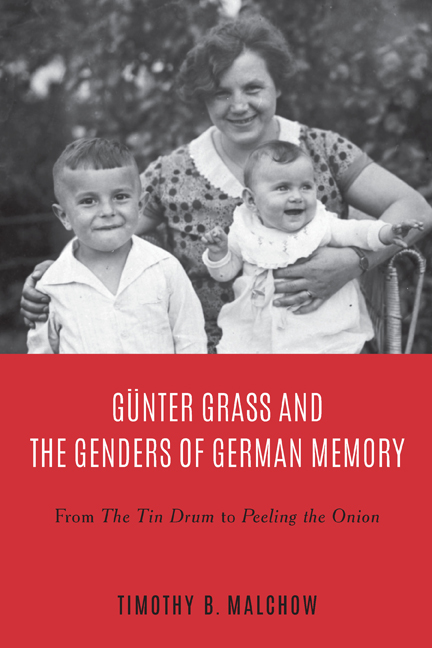Book contents
- Frontmatter
- Dedication
- Contents
- Acknowledgments
- Abbreviations, Translations, and Transcriptions
- Introduction
- 1 Grass’s Biography in Context: 1927–1959
- 2 Corporeal Memory, Trauma, and Art in The Tin Drum
- 3 Bildung, Heimat, and Gendered Modes of German Memory in The Tin Drum
- 4 A Patriarchal Arbiter of German Cultural Memory and His Feminized Others: Leveling Bildung, Opening Heimat, and Championing Art from the 1960s to the New Millennium
- 5 Grass’s Early Life Once Again: Broken Silence, Mourning, and Gendered Approaches to Memory in Peeling the Onion
- Epilogue
- Works Cited
- Index
- Frontmatter
- Dedication
- Contents
- Acknowledgments
- Abbreviations, Translations, and Transcriptions
- Introduction
- 1 Grass’s Biography in Context: 1927–1959
- 2 Corporeal Memory, Trauma, and Art in The Tin Drum
- 3 Bildung, Heimat, and Gendered Modes of German Memory in The Tin Drum
- 4 A Patriarchal Arbiter of German Cultural Memory and His Feminized Others: Leveling Bildung, Opening Heimat, and Championing Art from the 1960s to the New Millennium
- 5 Grass’s Early Life Once Again: Broken Silence, Mourning, and Gendered Approaches to Memory in Peeling the Onion
- Epilogue
- Works Cited
- Index
Summary
GRASS's MEMOIR Peeling the Onion undermines his gendered authority as a representative of the German cultural nation, focusing instead on personal mourning. In many ways, however, his final two prose works, the second and third installments of his so-called “memory trilogy” (Trilogie der Erinnerung), reassert what that first installment abandons. Reminiscent of how The Meeting at Telgte and Headbirths exalted the cultural nation and its male representatives in the wake of The Flounder's interrogation of masculinity, both The Box: Tales from the Darkroom (Die Box: Dunkelkammergeschichten, 2008) and the untranslated Grimms Wörter: Eine Liebeserklärung (The Grimms’ Words: A Declaration of Love, 2010) present Grass in his representative, masculine role. And yet both texts also celebrate the dynamism of culture, reflecting on the impermanence of its manifestations. The final passages of The Box make room for voices after Grass, imagining a multicultural Germany in which masculine representatives of the cultural nation are of waning importance. Though Grimms Wörter champions the cultural nation of the past, its mostly male artists, and their language, it also ends with a reflection on the inevitably changing nature of language and culture. However, Grass's widely derided 2012 poem “What Must Be Said” (“Was gesagt werden muss”) shows him once again in his masculine role, attempting to guide the German nation and influence the wider world. Ironically, the combination of its gendered imagery and naive formulations presents him as more impotent than effective.
Gender, Memory, and Art in The Box
The primary narrators of Grass's The Box: Tales from the Darkroom are his six children from three mothers and his two stepsons, all of whom appear pseudonymously to recall their experiences growing up in various familial configurations. They focus especially on Marie, a character based on the photographer and family friend Maria Rama, to whom the book is dedicated and whose old Agfa camera is the “box” of the title. They also relate their personal recollections of Grass, describe each of his literary works, and allude to his many activities in the realms of politics and culture. They depict the gendered relationship between the two central characters, Marie and Grass, as both personal and artistic in nature.
- Type
- Chapter
- Information
- Günter Grass and the Genders of German MemoryFrom The Tin Drum to Peeling the Onion and Beyond, pp. 199 - 216Publisher: Boydell & BrewerPrint publication year: 2021



